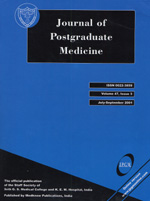
|
Journal of Postgraduate Medicine
Medknow Publications and Staff Society of Seth GS Medical College and KEM Hospital, Mumbai, India
ISSN: 0022-3859
EISSN: 0022-3859
Vol. 57, No. 1, 2011, pp. 20-30
|
 Bioline Code: jp11006
Bioline Code: jp11006
Full paper language: English
Document type: Research Article
Document available free of charge
|
|
|
Journal of Postgraduate Medicine, Vol. 57, No. 1, 2011, pp. 20-30
| en |
Impact of parenting practices on parent-child relationships in children with specific learning disability
Karande, S. & Kuril, S.
Abstract
Background: Parents of children with specific learning disability (SpLD) undergo stress in coping up with their child′s condition.
Aims: To document the parenting practices of parents having a child with newly diagnosed SpLD and to analyze their impact on parent-child relationships.
Settings and Design: Cross-sectional questionnaire-based study in our clinic.
Materials and Methods: From May 2007 to January 2008, 150 parents (either mother or father) of children consecutively diagnosed as having SpLD were enrolled. Parenting practices and parent-child relationships were measured by the Alabama Parenting Questionnaire-Parent Form (APQ-PF) and the Parent Child Relationship Questionnaire (PCRQ), respectively.
Statistical Analysis Used: Pearson correlation coefficients between subscales of APQ-PF and PCRQ were computed. Multiple regression analysis was carried out for statistical significance of the clinical and demographic variables.
Results: Parents who were: (i) "involved" in parenting had a good "personal relationship and disciplinary warmth," (ii) practicing "positive parenting" had good "warmth, personal relationship and disciplinary warmth," (iii) "poorly supervising" their child′s activities lacked "warmth and personal relationship," (iv) practicing "inconsistent discipline′ had a higher "power assertion" and (v) practicing "corporal punishment" lacked "warmth" and had a higher "power assertion and possessiveness" in their relationships with their child. Parent being poorly educated or currently ill and child having all three types of SpLD present concomitantly or a sibling or a sibling with a chronic disability or being in class standard IX to XI were variables that independently predicted a poor parenting or parent-child relationship subscale score.
Conclusions: The present study has identified parenting practices that need to be encouraged or excluded for improving parent-child relationships. Initiating these measures would help in the rehabilitation of children with SpLD.
Keywords
Attention-deficit/hyperactivity disorder, demographic factors, dyslexia, family, parent-child relations, parenting, questionnaires, scholastic backwardness, students
|
| |
© Copyright 2011 Journal of Postgraduate Medicine.
Alternative site location: http://www.jpgmonline.com
|
|
